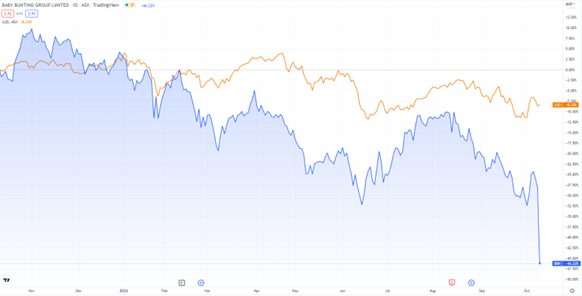Baby Bunting Group [ASX:BBN] saw its Q1 FY23 gross margin fall 2.3%, surprising management to the downside.
The reduction in gross margin was greater than BBN anticipated. Baby Bunting cited ‘tougher economic times’, noting that input costs have risen faster than retail prices.
Higher domestic freight charges were also partly to blame, said Baby Bunting.
BBY shares are down nearly 30% at the time of writing (Tuesday afternoon, 11/10/2022).
Year to date, BBN shares are down 40%:

Source: Tradingview.com
BBN trade update and AGM highlights
On Tuesday, BBN provided a year-to-date trading update along with a Q1 FY23 gross profit margin update.
These were the highlights:
- Year-to-date total sales grew 12.0%, cycling 2.1% last year ($507.3 million on $468.4 million).
- Gross profit was up 38.6% year-on-year, and total transaction growth was 15.2% year-to-date.
- Comparable store sales growth was 7.6%, cycling negative 0.9% over last year.
- Cost of Doing Business (as a percentage of sales) was up 85 basis points (bps), 28.6% for the full year.
- Q1 gross profit margin was down 230 bps compared with Q1 FY22.
- Pro-forma Q1 NPAT was $3 million below Q1 FY22, despite being up 13.6% ($29.6 million) for the full year.

Source: BBN
Baby Bunting’s CEO Matt Spencer said year-to-date sales growth displays an ‘uplift in total transactions of 15.2%’.
Mr Spencer said that the company’s Q1 performance came below expectations, adding it is the ‘smallest period of earnings’. He continued:
‘Over the last few years, we have made significant gross margin gains. However, in the first quarter, gross profit margin was 37.2%, down 230 basis points against the first quarter of FY22.
‘In Q1 FY23, we expected a minor year-on-year reduction in gross margin as a result of the Loyalty program only commencing in November 2021 plus more products moving to Every Day Low Price. The amount of the actual reduction has been greater than anticipated.’
Mr Spencer shared key drivers for the underwhelming performance:
- Unrecovered cost increases (input costs rising faster than retail prices, i.e. higher domestic freight and FX charges).
- Low consumer interest in the recently-expanded Playgear department (popular during COVID, though slowing to the effect of -$1 million relative to year-on-year).
- The new Loyalty Program discounting gross margin 60 bps more than anticipated.
‘Given the continuing economic uncertainty, inflationary pressures and other global challenges, we will not be providing any further guidance about FY23 earnings at this time,’ the CEO advised.
Baby Bunting points to positives
BBN said that despite its poor gross margin performance, there were some positives.
Inventory levels were ‘well-controlled’, with a promotional calendar that’s ‘consistent year-on-year’.
Baby Bunting said it was focused on opening eight new stores in both Australia and New Zealand this year.
Melanie Wilson, BBN’s Chair, said the company is focused on growing market share, intending to invest in digital experiences, growing in new markets, and improving profit margins.
Can fintechs rediscover their mojo?
Baby Bunting isn’t alone in feeling the effects of rising inflation and continued economic uncertainty.
Fintechs, in particular, have been hit hard as rising interest rates and macroeconomic turmoil sent fintech stocks plummeting.
While Baby Bunting was disappointed at its falling profit margin, some fintechs have no profits to speak of, prioritising growth at all costs.
Now, of course, profitability and cash reserves are back in vogue.
Investors now want their stocks to preserve and not incinerate capital.
That said, with the right choices, some fintechs can grow into very sturdy, lucrative businesses.
Our market expert Ryan Clarkson-Ledward has done the necessary research required for discerning these. He’s discovered three profitable fintech stocks flying under the radar. One of them, he says, is a start-up ‘wrestling with the big banks — and winning’.
Download Ryan’s free research report on three exciting fintechs here.
Regards,
Kiryll Prakapenka,
For Money Morning

